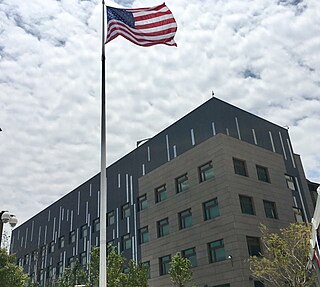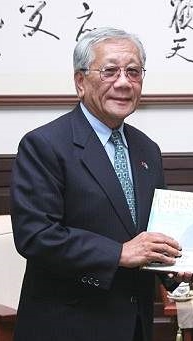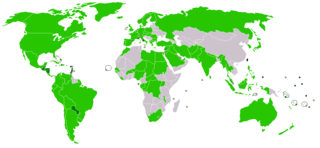| Ambassador of Palau to Taiwan | |
|---|---|
| Inaugural holder | Johnson Toribiong |
| Formation | October 4, 2001 |
The Palauan ambassador in Taipei is the official representative of the government in Ngerulmud to the government of Taiwan.
| Ambassador of Palau to Taiwan | |
|---|---|
| Inaugural holder | Johnson Toribiong |
| Formation | October 4, 2001 |
The Palauan ambassador in Taipei is the official representative of the government in Ngerulmud to the government of Taiwan.
| Diplomatic agrément/Diplomatic accreditation | Ambassador | Observations | President of Palau | List of premiers of the Republic of China | Term end |
|---|---|---|---|---|---|
| October 4, 2001 | Johnson Toribiong | [1] | Tommy Remengesau | Tang Fei | December 31, 2008 |
| July 1, 2009 | Jackson M. Henry | In 2010, Jackson Henry the previous Palau Ambassador to Taiwan resigned, | Tommy Remengesau | Wu Den-yih | 2010 |
| 2010 | Jon Marvin Ngirutang | Chargé d'affaires | Johnson Toribiong | Wu Den-yih | 2011 |
| August 24, 2012 | Peter Remedy Adelbai | (* July 24, 1959 in Koror, Palau)
| Johnson Toribiong | Sean Chen (politician) | February 28, 2013 |
| June 1, 2014 | Dilmei Louisa Olkeriil | [2] | Tommy Remengesau | Jiang Yi-huah | August 2022 |
| September 1, 2022 [3] / October 4, 2022 [4] | David Orrukem | First charge d'affairs to the United States | Surangel Whipps Jr. | Su Tseng-chang | present |

Palau, officially the Republic of Palau, is an island country in the Micronesia subregion of Oceania in the western Pacific Ocean. The republic consists of approximately 340 islands and connects the western chain of the Caroline Islands with parts of the Federated States of Micronesia.

Palau gained its independence October 1, 1994, with the entry into force of the Compact of Free Association with the United States. Palau was the last Trust Territory of the Pacific Islands territories to gain its independence. Under the Compact, the U.S. remains responsible for Palau's defense for 50 years.

The American Institute in Taiwan is the de facto embassy of the United States of America in Taiwan. AIT is a wholly owned subsidiary of the federal government of the United States in Taiwan with Congressional oversight. The AIT was officially created as a U.S. government-sponsored nonprofit, private corporation established under the auspices of the U.S. government to serve its interests in Taiwan.

Kuniwo Nakamura was a Palauan politician who served as the President of Palau from 1993 to 2001. He had earlier served as Vice President of Palau from 1989 to 1993, under Ngiratkel Etpison.

Numerous states have ceased their diplomatic recognition of the Republic of China during the last 70 years, since the founding of the People's Republic of China. Under the One China policy, the ROC is recognized by 11 UN member states and Holy See with 59 UN member states and Somaliland maintaining unofficial cultural and economic relations.

The Embassy of the United States, Taipei is a former United States diplomatic mission in Zhongshan District, Taipei, Taiwan. The building currently houses the Taipei Film House as a movie theater.
Visa requirements for Palauan citizens are administrative entry restrictions by the authorities of other states placed on citizens of Palau.

John Hennessey-Niland is an American diplomat who had served as the United States ambassador to Palau from 2020 to 2022.

Palau–Taiwan relations are the bilateral relations between the Republic of Palau and the Republic of China (Taiwan). Palau maintains an embassy in Taipei and Taiwan maintains an embassy in Koror City. Exchanges between the two nations range from agriculture, culture, education, fishery, medical services, tourism and water supply infrastructure. As of 28 December 2024, Palau is one of only 12 United Nations member states to have formal diplomatic relations with Taiwan.
The Belau Omal Marathon is an annual marathon in Palau. The inaugural edition of the race was held on 4 June 2023.
Mark Ucherbelau Rudimch is a Palauan businessman and politician and current member of the Senate of Palau.